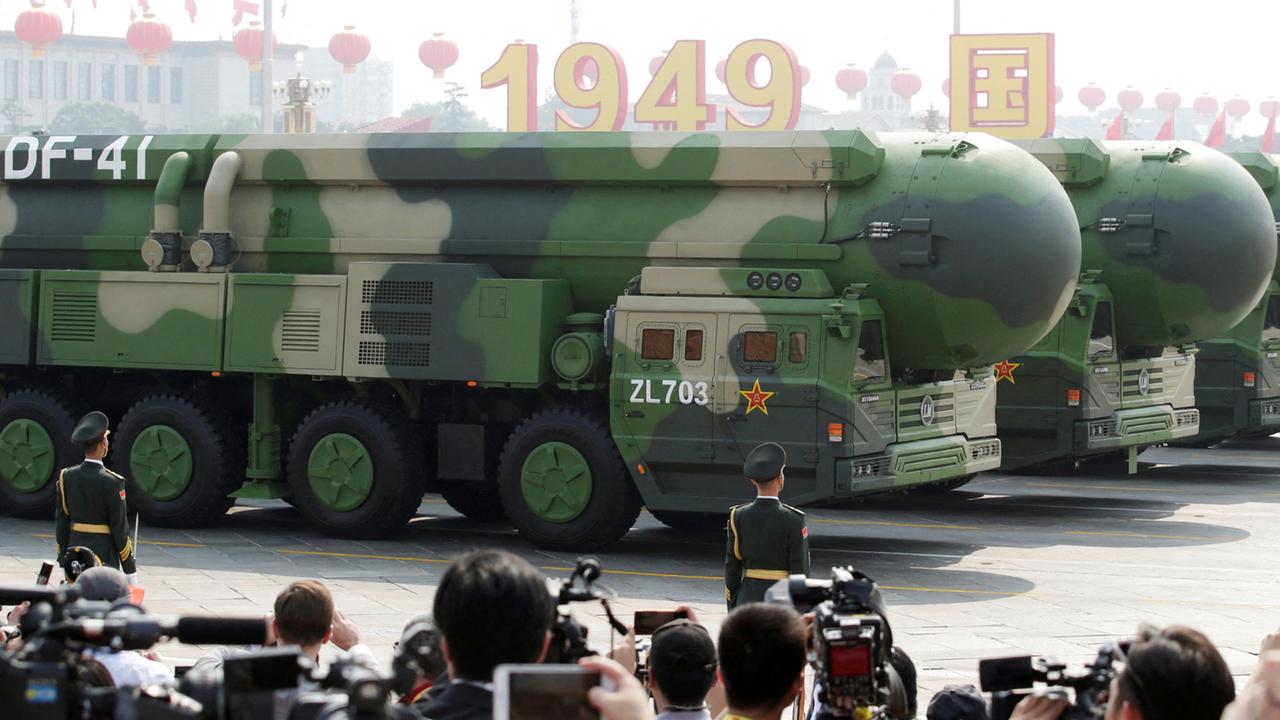interview
Ukraine war and protection of critical infrastructure: The EU is only now recognizing the threat China poses, says expert Vasselier. In the interview she talks about Beijing's international strategy and a dilemma.
tagesschau.de: Do you assume that China destroyed the submarine cables in the Baltic Sea?
Abigaël Vasselier: We must wait for the investigation to be completed before blaming China. We have to be extremely careful and refer to reliable facts. Otherwise, we would be abetting the disinformation that we ourselves are trying to combat.
This is particularly important because we Europeans find ourselves at a critical moment in which we recognize that China poses a threat to the European security architecture. We are having a very delicate and difficult discussion right now – so we need to make sure we have evidence here.

To person
Abigaël Vasselier leads the research team on China's foreign policy at the Mercator Institute for China Studies (MERICS) in Berlin. Previously, she was Deputy Head of Department for China, Hong Kong, Macau, Taiwan and Mongolia at the European External Action Service (EEAS). Before joining the EEAS, she was a policy fellow and coordinator of the Asia program at the European Council on Foreign Relations (ECFR).
“China has crossed its own red lines”
tagesschau.de: Why is China a threat to Europe's security?
Vasselier: Over the past two years, China has consistently stated that it will not provide Russia with lethal weapons. This was a form of reassurance to Europe and a red line for Beijing. For the past two years, China has consistently said it will not supply Russia with lethal equipment. But last week we received evidence that China is supplying deadly drones that are manufactured in its Xinjiang region and then sent to Russia. In this sense, China has crossed its own red lines.
China had already posed a threat to the European security architecture through its trade and financial flows with Russia. In 2023, the two countries' bilateral trade reached a record high of $240 billion, an increase of more than 26 percent compared to 2022.
This shows that China's exports to Russia are replacing goods from Europe and other sanctions partners. China has been an economic lifeline for Moscow. China already represented a security threat to us.
The second stage was then the supply of dual-use goods, high-tech goods that can be used for military purposes – material components and machine equipment that allow Russia to expand defense production. And now we have reached the next level with the export of lethal weapons.
And then there is military and security cooperation between Russia and China – from the Baltic Sea to cyberspace to outer space. The number of joint military exercises has increased dramatically. China conducted a joint military exercise with Russia in the Baltic Sea in 2017. All of this represents a real threat to the security of the European continent.
“If Russia undermines the West, it is to China's advantage”
tagesschau.de: What purpose does China pursue with this policy – and with Russia's military support?
Vasselier: It is not in China's interest for Russia to lose this war, because the goal is to weaken the West and the transatlantic partnership, including NATO. Beijing has the clear goal of taking the place of the great power of the century in the international order. If Russia undermines the West and the liberal values that the West stands for, then that is to China's advantage.
Through the war in Ukraine, China is gaining geostrategic space, especially in the global south, and can further position itself as an alternative to the West. This is very important for China. Given its global ambitions and the geopolitical situation we find ourselves in, China's support for Russia's war in Ukraine now poses a threat to the European security architecture.
However, I do not believe that the Chinese leadership wants China to be seen as a security threat to Europe. So Beijing finds itself in a real dilemma. Because China needs Europe, it needs the European market and European technology.
Therefore, it would prefer to have Europe at its side when positioning itself against the USA. That's why the Chinese keep coming to Europe and trying to change the European perspective on China. Without any success: China's support for Moscow continues to worsen relations and European perception of China.
A stable Europe – “on China's terms”
tagesschau.de: Nevertheless, it appears that the balance of conflicting interests within China – between undermining the West on the one hand and a stable global order for trade purposes on the other – has shifted in favor of an aggressive foreign policy.
Vasselier: I don't think there is a contradiction from the Chinese perspective. Beijing wants it all. China's vision for the world is clear: it wants to dominate the global trading system. And trade requires stability.
We must also not forget that the Communist Party's most important priority includes the survival and stability of the party.
However, we are in a phase in which socio-economic challenges in China could question the stability of the party. Today the party needs new legitimacy, a new social contract with the people. Security is the foundation of the Chinese social contract. So general stability remains a priority.
And yes: China also wants Russia to win the war. But it wants the rest of Europe to remain relatively stable – on China's terms. China wants European markets to continue to thrive and remain open to Chinese exports.
Therefore, China is making economic offers to European leaders aimed at changing the European perspective on China and reducing discussion of China as a security threat. This is a point where China and Russia have different global goals: China wants stability, Russia wants instability.
“Europe’s security is at stake”
tagesschau.de: In a study on the rapprochement between China and Russia, they demand that Europe must define the red lines for China and the consequences of crossing them. The red lines have now been crossed, you say. How should Europe react to this?
Vasselier: There are three types of answers. We have been telling the Chinese for two years: If Beijing supplies lethal weapons to Russia, there will be consequences.
Now that China has crossed its own red lines, these consequences were discussed with 27 foreign ministers in Brussels on Monday – unfortunately with no result so far. I very much hope that we will see what sanctions there will be in the next few days. That's one level.
On the second level, however, it is just as important to recognize that China represents a real security threat to Europe. We still talk about partnership and competition. So far, the Europeans have never said that China poses a security threat. NATO defined China as a “key driver of the war” at the last summit in July.
The final level is the question of how we strategically combine forces between NATO and the European Union in view of the threat from China. Europe's security is at stake.
But NATO's mandate to deal with China is extremely limited. We must expand this mandate in the Euro-Atlantic context. If China comes and challenges our security here in Europe, we must be able to respond within NATO.
As the EU, we must rethink Europe's response options to China's actions – now that China's red lines have been crossed. Synergies must be created between NATO and the EU in order to be able to respond to China as a threat to Europe.
Split between China and Russia “is not possible”
tagesschau.de: In your study you point out the need to counteract an even deeper deepening of Sino-Russian relations. Is that even still possible?
Vasselier: Sino-Russian relations are not easy. There are more differences and distrust than similarities and trust. Their future ideas about the world order also differ, particularly on the question of stability and the balance of power.
However, their relations are now deepening to such an extent that we can no longer try to divide China and Russia. The two countries are currently on a path of strategic deepening.
As Europeans, we need to be able to better understand the granularity and consequences of this relationship and to better understand what consequences this relationship will have for us. The issue of cooperation between China and Russia in space, for example, can be very problematic for Europe. The intensive technological integration of China and Russia will come at the expense of Europe because both countries use civilian products for military purposes.
Europe cannot afford to be surprised by what lies ahead. Europe must prepare and face reality. There is a duty to better understand the relations between the two countries in order to avoid being surprised. But we must not waste our efforts trying to divide them. Because that won't happen.
“China doesn’t want any peace broker be”
tagesschau.de: China shows no interest in acting as a peace broker between Ukraine and Russia. Are there Chinese interests that we could influence diplomatically to persuade China to de-escalate?
Vasselier: China had the chance to do this for two years – but didn't do it. Instead, China has increased the existential threat to Europe.
In the first phase of the war, Europe asked the Chinese to cooperate with us. They were very simple requests and shared interests, such as international food security, nuclear safety or the release of prisoners. Europe asked the Chinese to send some simple messages to Russia that would support these attempts.
Unfortunately, China has not supported Europe or Ukraine. Nothing happened. The only exception concerned the issue of nuclear security – because nuclear relations between China and Russia are based on mutual deterrence. So China has acted in this regard – but only to de-escalate in its own national interest.
China does not want to be a peace broker. What Beijing has proposed so far shows this clearly. In addition, China simply has limited contacts with Ukraine – so it did not even seek the opportunity to speak to both parties.
…




